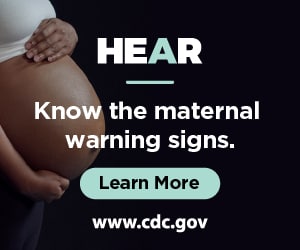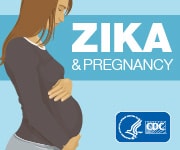After the Baby Arrives
After your baby arrives, there’s a lot to think about. Click on the following links to learn more about how to help keep you and your baby healthy and safe, as well as learn about certain birth defects and medical conditions.
Health
Breastfeeding: You and your baby gain many benefits from breastfeeding. Breast milk is easy to digest and has antibodies that can protect your baby from bacterial and viral infections.
Proper Handling and Storage of Breast Milk: Safely prepare and store your expressed breast milk to maintain its high quality and keep your baby healthy. Make sure your baby’s caregivers know how to safely prepare and store the breast milk, too.

Breastfeeding and Travel: Travel need not be a reason to stop breastfeeding. A mother traveling with a nursing infant may find breastfeeding makes travel easier than it would be if traveling with a bottle-fed infant. Find helpful tips for traveling while breastfeeding, and learn about vaccinations for international travel.
Postpartum Depression: Postpartum depression is depression that occurs after having a baby. If you think you have postpartum depression, seek treatment from your health care provider as soon as possible.
Jaundice and Kernicterus: Jaundice can sometimes lead to brain damage in newborns. Before leaving the hospital, ask your doctor or nurse about a jaundice bilirubin test. If you think your baby has jaundice, call and visit your baby’s doctor right away.
Vaccinations: Vaccines are very important to your baby’s health. When you get vaccinated against whooping cough and the flu during your pregnancy, you will pass some immunity (protection) to your baby. However, that protection will begin to decrease over time, leaving your infant vulnerable to disease. Make sure he or she gets vaccinated according to CDC’s childhood immunization schedule for safe, proven disease protection.
Immunization Schedules: Follow the schedule found at this link to be sure your baby gets his or her shots on time. If you miss any, check with your doctor about getting back on track.
Vaccination After Pregnancy: It is safe for a woman to receive vaccines right after giving birth, even while she is breastfeeding. Vaccination after pregnancy is especially important if you did not receive certain vaccines before or during your pregnancy.
Newborn Screening: Within 48 hours of your baby’s birth, a sample of blood is taken from a “heel stick,” and the blood is tested for treatable diseases. More than 98% of all children born in the United States are tested for these disorders.
Some babies with a critical congenital heart defect (CHD) appear healthy at first and may be sent home before their critical CHD is detected. Newborn screening for critical CHDs is a tool that works with prenatal diagnosis and physical exams after birth to improve detection of critical CHDs.
Your baby should be screened for hearing loss before 1 month of age, preferably before leaving the birth hospital. Learn more about newborn hearing screening and what happens if your baby doesn’t pass the screening test.
Once your baby is born, you can learn more about ATSDR’s Choose Safe Places for Early Care and Education program, which protects the health of children where they learn and play to reduce your child’s risk of being exposed to dangerous chemicals during their care.
Safety
Child Medication Safety: Every year, one out of every 150 two-year-olds is treated in an emergency department for an accidental medication overdose. Find tips for keeping all medications up and away and out of sight of young children.
Sudden Infant Death Syndrome (SIDS): Learn what parents and caregivers can do to help babies sleep safely and reduce the risk of sleep-related infant deaths, including SIDS.
Child Safety Seats: Motor vehicle injuries are a leading cause of death among children in the United States. But many of these deaths can be prevented. Always buckling children in age- and size-appropriate car seats, booster seats, and seat belts reduces serious and fatal injuries by up to 80%.
Travel: An estimated 2.4 million children from the United States travel internationally each year. Learn how to travel safely with your baby within the country and internationally.
Fire Safety: Find tips to help prevent injury or death from a fire in your home.
Child Maltreatment: Maltreatment is a serious problem that can have lasting harmful effects on a child’s life. Find some strategies to help prevent child maltreatment.
Disaster Safety for Expecting and New Parents Learn general tips to get prepared before a disaster and what to do in case of a disaster to help keep you and your family safe and healthy.

Development
Child Development: The early years of a child’s life are crucial for learning, social, and emotional development. Learn what you can do to ensure that your child grows up in an environment that meets his or her needs.
Positive Parenting Tips for Babies: Learn how to give your baby a healthy and safe start in the first year of life.
Learn the Signs. Act Early. Measuring your baby’s growth involves more than tracking height and weight. Learn about milestones to watch for in how your baby plays, learns, speaks, and acts.
Medical Conditions
Birth Defects: Birth defects are structural changes present at birth that can affect almost any part or parts of the body (e.g., heart, brain, foot). They may affect how the body looks, works, or both. About one in every 33 babies is born with a birth defect.
Developmental Disabilities: Developmental disabilities are a group of conditions due to an impairment in physical, learning, language, or behavior areas. About one in six children in the U.S. have one or more developmental disabilities or other developmental delays.
Genetics: If your baby was born with a genetic condition, you may want to work with a genetic counselor in your area to help with information, resources, and support.
Blood Disorders: CDC works to prevent and reduce complications among people with certain blood disorders (bleeding disorders, hemophilia, von Willebrand disease, thrombophilia, and thalassemia).


